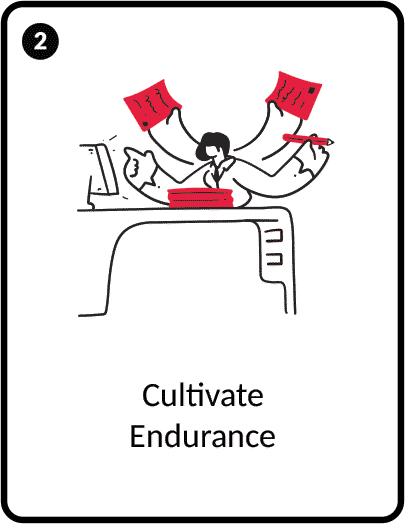
The problem
Staying focus for a long session can be exhausting. We get tired and less efficient.
Goal
Understanding your mind needs and focus rules, so you can arrange optimal focus.
Potential
Focus is like a muscle, properly managed, it can lead you to amazing results and good feelings, on short and long term.
4 powerful steps to build endurance
Definitions
Focus is a state or condition permitting clear perception or understanding.
Endurance is the ability to withstand hardship or adversity.
1. Power of breaks
The brain is a muscle, and like any muscle, it needs a proper rest / effort balance. His efficiency decreases after intense minutes of focus, up to a point of low functioning.
A big mistake a lot of entrepreneurs do is to try working for hours with taking little or no breaks. While that can sometimes lead to more results, it’s a terrible productivity fallacy. The problem here is that it’s possible to bypass your brain tiredness signals to work more hours, but the efficiency of those extra hours drastically decreases. In other words, you need more time of those extra hours to achieve the same results of your optimal hours. Doing this, you also miss the incredible power of breaks.
Working without taking breaks or for too long sessions is also misunderstanding how the brain works. Indeed, only a few parts of our neuronal network oversee our conscious processing. The bigger part of our neuronal network is subconscious and work mainly when the conscious network is off. This network is super powerful as it contains way more connections. That’s why you can get insights when you are taking your shower or having plenty of ideas that come effortlessly while you are strolling in a parc. So, when you pause, you not only give a chance to your consciousness to restore its energy, but also activate the power of the subconscious network.
Therefore, optimal focus and productivity are achieved when your brain has proper task balance and effort / rest balance. Let’s see below how to pause while maintaining your progression.
2. Productive breaks
What are they?
Productive breaks are breaks that restore your energy, creativity, motivation and willpower.
When to take them?
The best time to take them is when your focus start declining. Other good signals include tiredness, hunger, excessive wandering, or physical tension. Delaying or bypassing those signals creates a decrease in marginal efficiency, which means you’ll spend more time to achieve less.
Examples of productive breaks
– Any activity that uses a different area of the brain. For example, if you were programming (cognitive work) you can switch to making music (artistic work).
– Low focus activities like walking, listening to calm music, light chatting with a coworker, gardening, washing the dishes, eating…
– Meditation or sleeping
During those break sessions you may experiment many insights and restore your full potential for your next task.
How long should they be?
Between 5 and 20 minutes, depending on the tasks.
3. Rewarding breaks
What are they?
Working can make us nervous, stressed, anxious, frustrated or any negative mood that affects our productivity and health. A rewarding break give a chance to your brain to let go.
When to take them?
You feel that your emotions start to invade you and disturb and skew your thoughts and behaviors.
Examples of rewarding breaks
Any activities that provide you healthy pleasure (you decide what is healthy for you). Ideally activities that you enjoy doing and that restore your energy while stabilizing your mood:
– Spending time with your family, friends or love one
– Listening to your favorite song
– Eating a meal
– Playing with animals
– Massages
By bringing you a touch of pleasure and relaxation, the rewarding break help you to detach your mood from your work so you can come back with a more objective, fresh and happier energy. Just bear in mind that you are never sheltered from addictions, rewarding breaks shouldn’t be used as an escape of a job you hate as it may lead you to getting addicted.
How long should they be?
It depends on the emotional load of your mood. If you are just a bit tense, a hug from your love one can be enough to bring you back to clarity. However if you are crossing a deeply anxious moment, a full day off can be necessary.
4. Fulfilling Breaks
Fulfilling breaks are breaks you take on the long term, for example every 3 months. They look like holidays and are opportunities to improve your life at a deeper level.
Letting go
Fulfilling breaks are good to learn to let go toxic attachment toward your goal. This is important otherwise your happiness may fluctuate with the success degree of your progression, which can lead to severe mood instability. Stepping back also increases the desire you have toward your project or work, which will make you so much more motivated when you’ll be back.
Rewarding yourself
Even if you like your work and enjoy your life, rewarding yourself can be an important thing on the long term. Afterall, we as humans are programmed to supply effort to get things that maintain our survival. Rewarding yourself for your accomplishment also reinforce self-love.
Getting fresh again
When you are doing something for a long time, you barely can stay objective anymore. Sometimes you don’t even recognize mistakes that could slow you down or even kill what you do. Fulfilling breaks can be used to get a fresh restart of your vision, ideas and inspiration.




